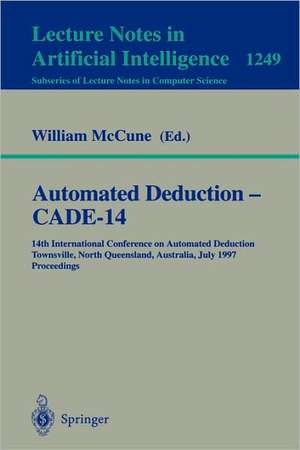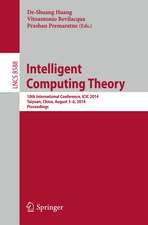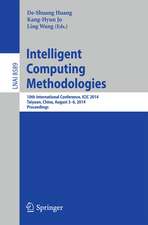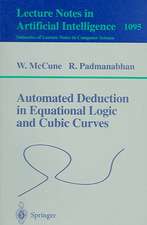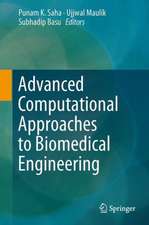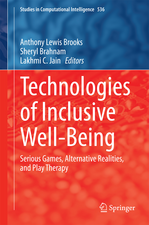Automated Deduction - CADE-14: 14th International Conference on Automated Deduction, Townsville, North Queensland, Australia, July 13 - 17, 1997, Proceedings: Lecture Notes in Computer Science, cartea 1249
Editat de William McCuneen Limba Engleză Paperback – 18 iun 1997
The volume presents 25 revised full papers selected from a total of 87 submissions; also included are 17 system descriptions and two invited contributions. The papers cover a wide range of current issues in the area including resolution, term rewriting, unification theory, induction, high-order logics, nonstandard logics, AI methods, and applications to software verification, geometry, and social science.
Din seria Lecture Notes in Computer Science
- 20%
 Preț: 1020.28 lei
Preț: 1020.28 lei -
 Preț: 395.25 lei
Preț: 395.25 lei - 20%
 Preț: 327.36 lei
Preț: 327.36 lei - 20%
 Preț: 556.96 lei
Preț: 556.96 lei - 20%
 Preț: 400.77 lei
Preț: 400.77 lei - 15%
 Preț: 558.12 lei
Preț: 558.12 lei - 20%
 Preț: 328.94 lei
Preț: 328.94 lei - 20%
 Preț: 340.04 lei
Preț: 340.04 lei - 20%
 Preț: 487.46 lei
Preț: 487.46 lei - 20%
 Preț: 629.71 lei
Preț: 629.71 lei - 20%
 Preț: 386.08 lei
Preț: 386.08 lei - 20%
 Preț: 489.11 lei
Preț: 489.11 lei - 20%
 Preț: 620.33 lei
Preț: 620.33 lei - 20%
 Preț: 733.68 lei
Preț: 733.68 lei - 20%
 Preț: 1033.45 lei
Preț: 1033.45 lei - 20%
 Preț: 782.57 lei
Preț: 782.57 lei - 20%
 Preț: 679.09 lei
Preț: 679.09 lei - 20%
 Preț: 330.54 lei
Preț: 330.54 lei - 20%
 Preț: 1137.10 lei
Preț: 1137.10 lei - 20%
 Preț: 435.28 lei
Preț: 435.28 lei - 20%
 Preț: 375.72 lei
Preț: 375.72 lei - 20%
 Preț: 342.61 lei
Preț: 342.61 lei - 20%
 Preț: 432.78 lei
Preț: 432.78 lei - 20%
 Preț: 904.16 lei
Preț: 904.16 lei - 20%
 Preț: 1391.87 lei
Preț: 1391.87 lei - 20%
 Preț: 373.80 lei
Preț: 373.80 lei - 20%
 Preț: 400.17 lei
Preț: 400.17 lei - 20%
 Preț: 1359.66 lei
Preț: 1359.66 lei - 20%
 Preț: 984.64 lei
Preț: 984.64 lei - 20%
 Preț: 560.93 lei
Preț: 560.93 lei - 20%
 Preț: 731.97 lei
Preț: 731.97 lei - 20%
 Preț: 563.29 lei
Preț: 563.29 lei - 20%
 Preț: 403.00 lei
Preț: 403.00 lei - 20%
 Preț: 793.92 lei
Preț: 793.92 lei - 20%
 Preț: 324.19 lei
Preț: 324.19 lei - 20%
 Preț: 733.68 lei
Preț: 733.68 lei - 20%
 Preț: 336.86 lei
Preț: 336.86 lei - 20%
 Preț: 327.36 lei
Preț: 327.36 lei - 20%
 Preț: 573.45 lei
Preț: 573.45 lei - 20%
 Preț: 558.53 lei
Preț: 558.53 lei - 20%
 Preț: 850.42 lei
Preț: 850.42 lei - 20%
 Preț: 560.93 lei
Preț: 560.93 lei - 20%
 Preț: 560.93 lei
Preț: 560.93 lei - 20%
 Preț: 631.96 lei
Preț: 631.96 lei - 20%
 Preț: 568.70 lei
Preț: 568.70 lei - 20%
 Preț: 488.90 lei
Preț: 488.90 lei - 20%
 Preț: 293.24 lei
Preț: 293.24 lei
Preț: 328.62 lei
Preț vechi: 410.77 lei
-20%
Puncte Express: 493
Preț estimativ în valută:
58.11€ • 68.51$ • 50.15£
58.11€ • 68.51$ • 50.15£
Carte tipărită la comandă
Livrare economică 19 martie-02 aprilie
Specificații
ISBN-13: 9783540631040
ISBN-10: 3540631046
Pagini: 484
Ilustrații: XIV, 462 p.
Dimensiuni: 216 x 279 x 25 mm
Greutate: 0.67 kg
Ediția:1997
Editura: Springer Berlin, Heidelberg
Colecția Springer
Seriile Lecture Notes in Computer Science, Lecture Notes in Artificial Intelligence
Locul publicării:Berlin, Heidelberg, Germany
ISBN-10: 3540631046
Pagini: 484
Ilustrații: XIV, 462 p.
Dimensiuni: 216 x 279 x 25 mm
Greutate: 0.67 kg
Ediția:1997
Editura: Springer Berlin, Heidelberg
Colecția Springer
Seriile Lecture Notes in Computer Science, Lecture Notes in Artificial Intelligence
Locul publicării:Berlin, Heidelberg, Germany
Public țintă
ResearchCuprins
The char-set method and its applications to automated reasoning.- Decidable call by need computations in term rewriting (extended abstract).- A New approach for combining decision procedures for the word problem, and its connection to the Nelson-Oppen combination method.- On equality up-to constraints over finite trees, context unification, and one-step rewriting.- Dedam: A kernel of data structures and algorithms for automated deduction with equality clauses.- The Clause-Diffusion theorem prover Peers-mcd (system description).- Integration of automated and interactive theorem proving in ILF.- ILF-SETHEO.- SETHEO goes software engineering: Application of ATP to software reuse.- Proving System Correctness with KIV 3.0.- A practical symbolic algorithm for the inverse kinematics of 6R manipulators with simple geometry.- Automatic verification of cryptographic protocols with SETHEO.- A practical integration of first-order reasoning and decision procedures.- Some pitfalls of LK-to-LJ translations and how to avoid them.- Deciding intuitionistic propositional logic via translation into classical logic.- Lemma matching for a PTTP-based top-down theorem prover.- Exact knowledge compilation in predicate calculus: The partial achievement case.- Non-horn magic sets to incorporate top-down inference into bottom-up theorem proving.- Alternating automata: Unifying truth and validity checking for temporal logics.- Connection-based proof construction in linear logic.- Resource-distribution via Boolean constraints.- Constructing a normal form for Property Theory.- ?mega: Towards a mathematical assistant.- Plagiator — A learning prover.- CODE: A powerful prover for problems of condensed detachment.- A new method for testing decision procedures in modal logics.- Minlog: A minimal logictheorem prover.- SATO: An efficient prepositional prover.- Using a generalisation critic to find bisimulations for coinductive proofs.- A colored version of the ?-calculus.- A practical implementation of simple consequence relations using inductive definitions.- Soft typing for ordered resolution.- A classification of non-liftable orders for resolution.- Hybrid interactive theorem proving using nuprl and HOL.- Proof tactics for a theory of state machines in a graphical environment.- RALL: Machine-supported proofs for relation algebra.- Nuprl-Light: An implementation framework for higher-order logics.- XIsabelle: A system description.- XBarnacle: Making theorem provers more accessible.- The tableau browser SNARKS.- Jape: A calculator for animating proof-on-paper.- Evolving combinators.- Partial matching for analogy discovery in proofs and counter-examples.- Dialog.
